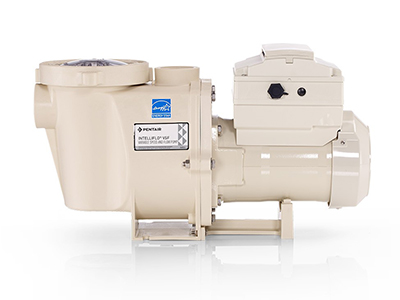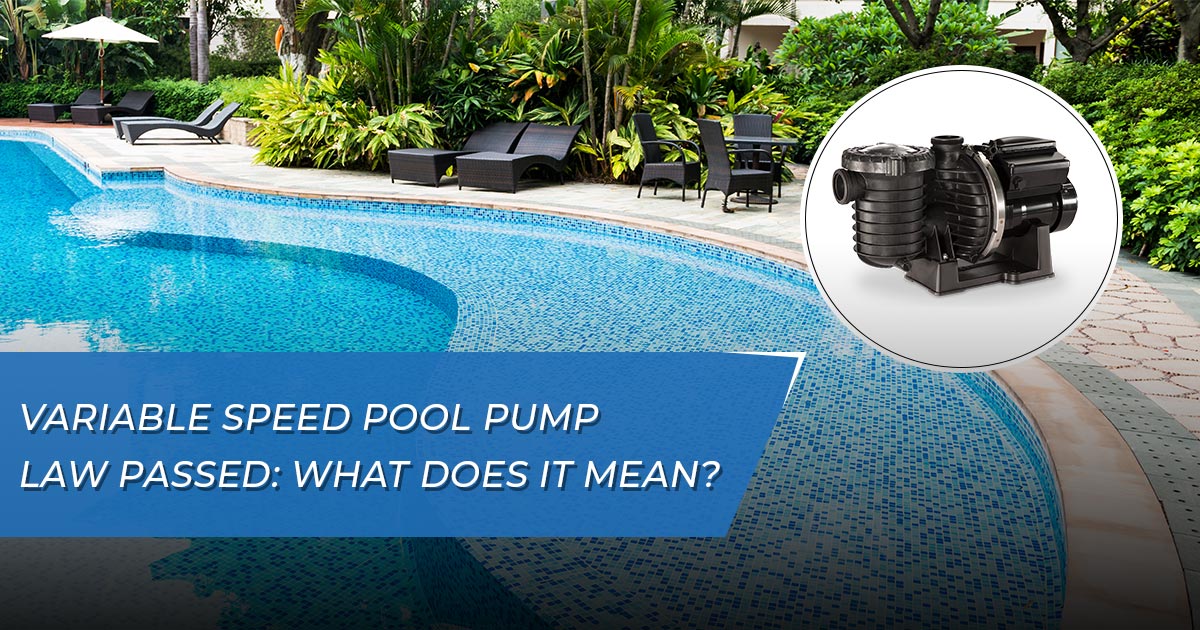Variable Speed Pool Pump Law Passed: What does it mean?
Any swimming pool owner will likely tell you that one of the most important pieces of equipment in their system is the pool pump. Not only does it improve water quality on a regular basis, but it can help maximize the lifespan of the entire pool as well.
Recently, a new variable speed pool pump law went into effect that outlines a certain set of minimum requirements for pool pumps to meet. The rule took several years to put together and refine. It was written in part using feedback offered by hardware suppliers, pool industry trade organizations, consumer advocacy groups and others. If you’re planning to install a new pool (or have started the process of making modifications or upgrades to your existing equipment), you’ll definitely want to be aware of the finer points of this variable speed pool pump regulation as you move forward.
The Variable Speed Pool Pump Law: Breaking Things Down
The new variable speed pool pump regulation comes by way of the United States Department of Energy. As of July 19, 2021, all new pool installations and replacements must meet certain minimum requirements with regard to motor horsepower and other specifications. The law applies to any new or replacement pool pump with more than 1.15 total horsepower.
Interestingly, the variable speed pool pump law itself does not expressly reference variable speed pool pumps by name. But when you look at the minimum requirements of the variable speed pool pump regulation, it becomes obvious that this is the only type of pump that clears that bar.
It’s also important to note that the variable speed pool pump law does not require the owners of single speed pumps to run out and purchase replacements. When their current pumps fail or otherwise need to be replaced, however, this change will have to be made.
The new variable speed pool pump regulation does not affect every kind of new equipment. For example, it doesn’t forbid the use of single speed pumps when they are installed in above-ground swimming pools. This is one of the few exceptions to the law as written. Other exceptions include the types of booster pumps that are commonly used for pressure pool cleaners and waterfalls. Spa and circulation pumps are also unaffected.
What are Variable Speed Pool Pumps, and Why Do They Matter?
 As the name suggests, a variable speed pool pump is one that can operate at different speeds depending on the context. It runs at a wider range of speeds than a dual speed pool pump. When variable pumps are used, the energy consumption goes down as the speed is reduced. This makes them an attractive purchase for people who value flexibility and long-term affordability.
As the name suggests, a variable speed pool pump is one that can operate at different speeds depending on the context. It runs at a wider range of speeds than a dual speed pool pump. When variable pumps are used, the energy consumption goes down as the speed is reduced. This makes them an attractive purchase for people who value flexibility and long-term affordability.
Increased energy efficiency translates to energy savings on a monthly basis. While it’s true that a variable speed pump will probably cost more to buy than less sophisticated alternatives, it will still likely cost less to own in the long run. One recent study even indicated that swimming pool owners see a reduction of 40 to 80 percent in their monthly utility costs after switching to a newer and more efficient variable speed pump.
For most homeowners, one of the biggest appeals of a variable speed pool pump comes by way of the better filtration systems that they are typically known to provide. In addition to generating cleaner water, this can lead to longer-lasting equipment as well.
Because of the advanced technology in variable speed pool pumps, they also tend to produce far less noise than other options. This creates a better user experience (and is one aspect that benefits your neighbors because the outdoor environment becomes much quieter in general).
Any one of these advantages is compelling on its own. When you put them together, it’s easy to see why variable speed pool pumps have become so popular over the last few years. Therefore, the variable speed pool pump law shouldn’t be considered a bad thing by any stretch of the imagination.
When it comes to selecting the right variable speed pool pump to meet your needs, there are a number of significant factors to keep in mind. The flow rating is quite possibly the most important consideration. It directly relates to the amount of water flow that a pump can handle relative to its horsepower. Bigger pools generally require higher flow ratings and operate more efficiently at higher speeds as well.
Another important factor has to do with the PVC pipe size of your particular variable speed pump. Installing a pump with PVC that is too small will lead to efficiency issues, which eliminates one of the major advantages that this type of equipment is known to offer. There is also the fact that this deficiency could result in damage to the entire system over the long term.
Finally, it is important to carefully consider whether you’ll be needing a side-mount or top-mount variable speed pool pump. Thankfully, this is a decision that will almost always be made for you. The layout of your pool and other landscaping features will typically dictate which style of pump is required. Having said that, most people agree that a side-mount pump is definitely preferable when it’s a viable option.
The GPS Pools Approach to the Pool Pump Regulation
At GPS Pools, our hardworking and passionate team members have the ability to handle the installation, repair, and maintenance of any variable speed pool pump that a customer might have. We also sell swimming pool supplies and other products from all of the top brands in the industry like Pentair, Hayward, and Jandy (just to name a few). We’ll work with you to make sure that you gain all of the innovative solutions you need to keep your pool functioning at its best—exactly the way it should be.
If you’d like to learn more about the recent passage of the variable speed pool pump law, or if you just have additional questions that you’d like to go over in a bit more detail, please don’t delay—contact GPS Pools today.

